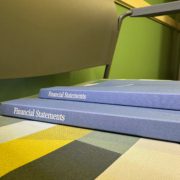Why I Decided to Become an Accountant
By Thomas Smail
If you are anything like me, circa 2019, and feeling a sense of instability with a vague sense of direction upward in your current career, I invite you to consider becoming an accountant. Yes, I realize that might be one of the last things someone would write about as a job. I understand I’m not writing about becoming an astronaut, an investment banker, or some other stereotypically cool job, but stay with me; I promise that you will, at worst, come away with a more positive perspective on my profession.
When I tell people what I do, they generally think the following:
- My line of work is boring
- The people are practically introverted robots
- We have a terrible work-life balance
But those types of people are found in every profession, no matter what you do. Don’t believe everything you hear on the internet — these stereotypes should not be on your list if you’re considering this as a profession.
To give you a short background on me, I decided to become an accountant in my late 20s. To be more precise, I was 27 years old when I decided to leave my current job as a hospital administrator in the emergency department and pursue accounting as my career path. I was 28 when I enrolled in a Master of Accounting program and 29 when I started my first job out of school at a large firm in their audit division.
My 20s were quite the whirlwind now that I think back on it. There’s so much that I could discuss, but I’ll give you the summarized version. After graduating from college, I pursued admission to Dental School. I took extra classes, shadowed when I could, pursued (and later achieved) a master’s degree in public health, worked multiple jobs as I could, interned for a major nonprofit providing dental services around the world, got my grades and test scores above the admissions standards for the schools, and still did not reach my goal after three (nearly four) years of pursuit. I took it as a sign that this career was not meant to be. Following that, I worked in two sales jobs and, as I previously mentioned, as a hospital administrator. I was exhausted by my job as a hospital administrator. There was very little reward for working longer hours at your job, the salary of my position had no lucrative future ahead of it, and any promotion that I wanted, I had to move around for.
Don’t get me wrong, I loved certain aspects of my job. I got to work with some great people, I learned a lot about the healthcare system, and I was able to use my position to help as many patients as I could in a place that people usually try to avoid as much as possible. Still, my tolerance for getting yelled at, cursed out, and demeaned by patients (and, at times, the clinical staff) was fading.
I had to take a major step back and reflect on what I liked about the jobs and classes I took. I really enjoyed presenting financial metrics as key performance indicators (KPIs) and exploring how they would affect our strategic decisions. I liked taking a deep dive into the KPIs to see what they were and what actions in the business would increase or decrease their balances. I was able to do that in each of my jobs to a certain extent, and I realized that I was most excited and, most importantly, eager to learn more when I was involved with the finances related to my job and department. It was then that I committed to exploring a different career path that would be more involved in the financial world.
To tell you the truth, I explored pursuing an MBA before I decided on accounting. It sounds good, and the potential career paths are exciting. However, I then realized that the career paths were not very well defined, and there aren’t a lot of specialized skills that you get trained for.
Accounting was different. Accounting, in and of itself, is a specialized skill and education that is very much needed in today’s world. In this profession, it is essential to understand the impact of various financial metrics on my client’s business, and use what I know from both an audit and tax perspective to help improve my client’s viability and future.
There is a direct path to success, standards for your competencies, licensures to cement yourself as a professional, and a wide range of jobs in which you have the tools to succeed. Our hard work, efficiency, commitment, and long hours are recognized in many ways. There is, more or less, a clear pathway to get to the top (partner, CFO, director, etc.), which gives us all something to work towards. As a bonus for me, I get to work for a place that helps local businesses get their taxes filed and helps them plan (financially) for a stable and successful future. Believe me when I tell you that the expertise you provide has a positive downstream impact on your clients, even if you don’t see it.
I could go on for longer here, but I think we should wrap this up. The decision to become an accountant changed my life. It allowed me to move in a more positive direction — a direction filled with purpose, clear goals, many resources to satisfy my professional curiosities, and stability that I never knew before.
No career is perfect, and I don’t make this recommendation to become an accountant lightly. This field requires a lot of hard work and can be very demanding during the busy (tax) season. The truth is that nothing good in this life comes easy, but it certainly is achievable. If what you’ve read in this post does not appeal to you at all, I would recommend reassessing what piques your curiosity and to pursue a career with that in mind. The last thing I want for you is to choose the wrong path and set yourself up for failure.
If what I wrote is where you think your passions lie, then, go for it. I encourage you to contact me by email — I would be happy to answer any questions about what I do and why I like it so much.










